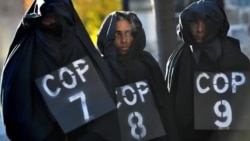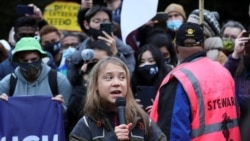On November 2, Saudi Arabia’s ambassador to the U.K., Prince Khalid bin Bandar Al Saud, told the London-based pan-Arab newspaper Asharq Al-Awsat that his country welcomed efforts to combat climate change.
Speaking in Glasgow, Scotland, at the start of the 26th Conference of Parties to the United Nations Framework Convention on Climate Change (UNFCCC), or COP26, Al Saud said achieving carbon neutrality might require technologies that do not yet exist. Echoing British Prime Minister Boris Johnson, he said the world needs a “green industrial revolution.”
“Saudi Arabia aims to limit climate change and combat it effectively, which is a unified goal for the international community,” Al Saud said.
That statement, however, is misleading. Despite the Kingdom’s declarations in favor of green solutions, environmental groups say Saudi Arabia worked to weaken the Glasgow results.
Saudi Arabia is the world’s No. 2 oil exporter behind the United States. Russia, Canada and China round out the top five spots, in that order.
On November 7, Greenpeace on its website accused Saudi Arabia negotiators at COP26 of blocking Glasgow’s cover decision, the main conference agreement detailing how 196 countries will strengthen their commitments on climate change.
The environmental group said Saudi Arabia has been able to undermine the talks because decisions require the consensus of all participating countries, and even one can stymie progress.
“There are no agreed voting rules … because Saudi Arabia has been blocking them since the body was created after the 1992 Rio Earth Summit,” Greenpeace said.
The Saudis, along with China, India and other developing countries, lobbied to remove “1.5C” from the COP26 cover decision, a reference to the goal of limiting the increase in global warming to 1.5 degrees Celsius. Achieving that goal would require sharp reductions in carbon dioxide (CO2) emissions by 2030, and reaching net zero emissions by 2050.
The Saudi government is also resisting efforts to help people worldwide adapt to increasing temperatures, Greenpeace said. In October, the BBC reported on a set of leaked documents, provided by Greenpeace’s investigative unit, that had been submitted to scientists ahead of a critical U.N. report assessing the status of climate change.
“An adviser to the Saudi oil ministry demands ‘phrases like “the need for urgent and accelerated mitigation actions at all scales…” should be eliminated from the report.’ ” the BBC wrote. “Saudi Arabia … requests the U.N. scientists delete their conclusion that ‘the focus of decarbonisation efforts in the energy systems sector needs to be on rapidly shifting to zero-carbon sources and actively phasing out fossil fuels.’ ”
Instead, the Saudis along with China, Australia and Japan, pushed investment in expensive carbon capture and storage technologies to combat climate change.
The Wall Street Journal also reported on the leaked documents. The paper said the Saudis asked scientists to “drop their references to net zero emissions” and replace the term “carbon emissions” with the broader term “greenhouse gas emissions,” which include all emissions contributing to global warming, not just fossil fuels.
The International Energy Agency (IEA) reported in May that in order to reach net zero carbon by 2050, no funds should be invested in oil, gas or coal supply projects after this year.
The Saudi government’s approach is nothing new.
“The Saudi government has a long history of attempting to sabotage climate talks, with varying degrees of success,” Greenpeace said in its November 7 post. “Six years ago in Paris they strenuously resisted efforts to enshrine ambitious goals in the text. Their negotiators objected to the mention of 1.5C and demands for periodic reviews of climate plans.
“Saudi negotiators also demanded that if Small Island Nations like Kiribati be compensated for climate change, the Kingdom should also be protected from loss of future oil income.”
Although Riyadh has pledged to reach zero-net carbon by 2060, the Saudi oil giant Aramco announced in October that it will increase production from 12 to 13 million barrels a day by 2027.In addition, the company plans to expand its oil trading business from 5.5 million barrels a day to 8 million barrels a day over the next five years.
On November 10, Prince Abdulaziz bin Salman Al Saud, Saudi Arabia’s energy minister and envoy to the Glasgow summit, told COP26 delegates that no energy source should be excluded from the list of climate solutions.
“It’s important that we recognize the diversity of climate solutions ... without any bias towards or against any particular source of energy,” he said. Al Saud also denied Greenpeace’s allegations that Saudi Arabia blocked progress in the talks, calling them “fabrications.”
Along with China and India, the Kingdom has yet to present its official plans to cut emissions.
Climate Action Tracker, an independent watchdog group, classifies Saudi Arabia’s climate interventions so far as “Highly insufficient,” meaning minimal to absent.
“Saudi Arabia has put few climate policies in place beyond some investments into rail and public transportation, and diversification efforts to move away from a fossil fuel-based economy have been slow,” Climate Action Tracker said.
A draft of the COP26 agreement released November 12 contained an unprecedented mention of fossil fuels. But the document fell short of the urgency reflected in the “code red” scientific report in August from the Intergovernmental Panel on Climate Change.
Key points from the report, put together by scientists in 66 countries:
- Atmospheric CO2 in 2019 was higher than any time in at least 2 million years.
- Surface temperature has increased faster since 1970 than any other 50-year period in the last 2,000 years.
- Since 1900, the global mean sea level has risen faster than any time in the last 3,000 years.
- Human activities account for 1.1 degrees Celsius from 1850-1900, and that will exceed 1.5 degrees over the next 20 years.







